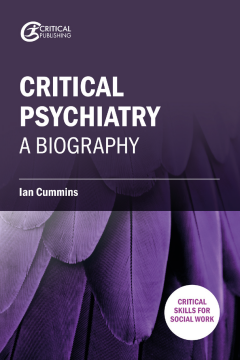
Additional Information
Book Details
Abstract
Critical Psychiatry outlines the history of a group of thinkers that has come to be known as the anti-psychiatry movement. Though it has been called a movement, the individual thinkers’ and authors’ ideas were often in conflict but what they share is a critical perspective on psychiatry as a discipline and institutionalised modes of care.
The current crisis in mental health services means that it is time to examine once again the key themes of critical psychiatry. The excesses of the 1960s radicalism have meant that these themes - with an emphasis on the individual dignity of all those involved in mental health services - have been lost. These need to be rediscovered as part of a solution to current difficulties but also as the starting point for a new model of service provision.
Critical Psychiatry is a history of ideas. It provides a critical evaluation of key thinkers and the application of their work to contemporary mental health service settings.
Ian Cummins is senior lecturer in social work at the University of Salford. His main research revolves around the experiences of people with mental health problems in the Criminal Justice system with a focus on policing and mental illness. This is linked to an exploration of the development of the penal state and its interaction with community based mental health services. He is interested in the ways the CJS has become, in many incidences, the default provider of mental health care
Table of Contents
| Section Title | Page | Action | Price |
|---|---|---|---|
| Cover | Cover 1 | ||
| Half-title | i | ||
| Series page | ii | ||
| Title page | iii | ||
| Copyright information | iv | ||
| Dedication page | v | ||
| Table of Contents | vii | ||
| Meet the author | ix | ||
| Acknowledgements | xi | ||
| Introduction | 1 | ||
| Critical psychiatry Or anti-psychiatry | 1 | ||
| Psychiatry and the counterculture | 2 | ||
| 1 R D Laing: the psychiatrist of the counterculture | 5 | ||
| Glasgow | 6 | ||
| Major works | 6 | ||
| The rumpus room and the establishment of Kingsley Hall | 7 | ||
| Kingsley Hall | 9 | ||
| Laing, the family and madness | 9 | ||
| Mental illness as a journey | 10 | ||
| Mad to be normal? | 11 | ||
| 2 Michel Foucault | 15 | ||
| Madness and Civilization | 16 | ||
| Responses to Foucault | 19 | ||
| The continuing importance of Foucault | 21 | ||
| Conclusion | 22 | ||
| 3 Erving Goffman: madness, and the asylum as a total institution | 25 | ||
| Stigma | 26 | ||
| The Insanity of Place | 26 | ||
| Asylums | 26 | ||
| Total institutions | 27 | ||
| Institutionalisation | 28 | ||
| Identity and the loss of self | 30 | ||
| Goffman’s legacy | 31 | ||
| 4 Frantz Fanon: Black Minds Matter – race, psychiatry and revolutionary politics | 33 | ||
| Key works | 34 | ||
| Othering | 34 | ||
| Race, racism and mental health services | 36 | ||
| Conclusion | 40 | ||
| 5 Thomas Szasz: a libertarian challenge to the ‘therapeutic state’ | 43 | ||
| The Myth of Mental Illness | 44 | ||
| The therapeutic state, consent and coercion | 45 | ||
| Discussion | 49 | ||
| 6 Franco Basaglia: psychiatry as radical politics | 53 | ||
| Gramsci | 54 | ||
| The radical politics of 1968 | 54 | ||
| Basaglia in Gorizia | 55 | ||
| Basgalia’s Law or Law 180 | 56 | ||
| Critical perspectives on Basaglia’s work | 56 | ||
| Basaglia and contemporary mental health services | 58 | ||
| Conclusion | 59 | ||
| 7 David Rosenhan: an experiment revisited | 61 | ||
| The Rosenhan experiment | 61 | ||
| Rosenhan’s main conclusions | 63 | ||
| Critical responses to Rosenhan | 64 | ||
| Discussion | 65 | ||
| Conclusion | 67 | ||
| 8 Plath, Frame and Kesey: psychiatry and the literary imagination | 69 | ||
| The Bell Jar | 70 | ||
| The novels of Janet Frame | 71 | ||
| One Flew Over the Cuckoo’s Nest | 72 | ||
| Psychiatry, ECT and representation | 73 | ||
| Conclusion | 73 | ||
| Conclusion | 77 | ||
| Community care | 79 | ||
| Recovery | 80 | ||
| Conclusion | 82 | ||
| Bibliography | 83 | ||
| Index | 93 |
